| Article ID | Journal | Published Year | Pages | File Type |
|---|---|---|---|---|
| 2509147 | Research in Social and Administrative Pharmacy | 2009 | 9 Pages |
Predictors of patients' willingness to pay for inhaled insulin are unknown. This study found patients with higher annual household income and those who were dissatisfied with their current insulin therapy were willing to pay for inhaled products.BackgroundNot all diabetes patients are receptive to taking injectable insulin and may therefore be noncompliant. Inhaled insulin has been shown to be as efficacious as subcutaneous insulin, but determinants of patients' willingness to pay (WTP) for inhaled insulin are unknown.ObjectivesThe objective of this study was to determine the relationship between various patient characteristics and patient satisfaction variables with WTP for inhaled insulin.MethodsExploratory cross-sectional study using a random sample of patients with diabetes from a national database. Data were collected using a mailed survey focusing on patient satisfaction with current insulin therapy, WTP, and general patient information. Any WTP (categorical) and the amount (continuous) patients were willing to pay were the 2 dependent variables in the study. Data were analyzed using SPSS v.15.0. Descriptive statistics as well as linear and logistic regression analyses were conducted.ResultsOne hundred twenty-eight patients responded. The logistic regression analysis indicated that annual household income (P = .038) and patient satisfaction (P = .002) predict WTP. Additionally, the current cost of insulin therapy (P = .009) and annual household income (P = .049) were found to predict the amount patients were willing to pay. On average, patients were willing to pay $55.49 out of pocket for inhaled insulin per month.ConclusionsThe out-of-pocket cost that patients were willing to pay was the same as the amount patients pay presently for their insulin and syringes. Although Exubera® is no longer on the market, the study findings can have an impact on pharmaceutical companies working on new inhaled insulin products in their efforts to care for patients with diabetes.
